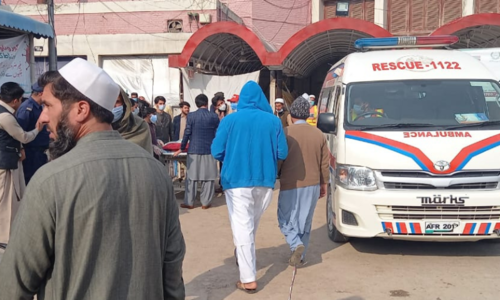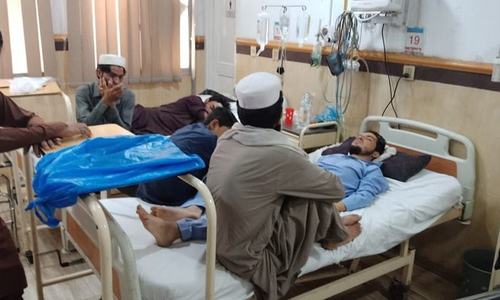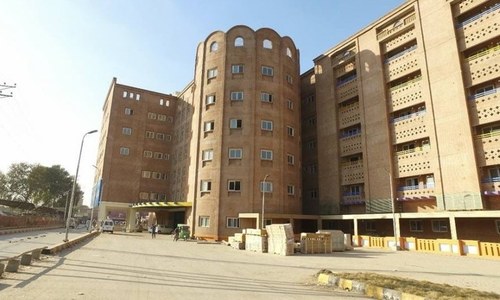Seven officials of Peshawar's Khyber Teaching Hospital (KTH), including the hospital's Medical Teaching Institution (MTI) director, were suspended after an inquiry committee found they were negligent in performing their duties which caused the deaths of at least six patients due to shortage in oxygen supply.
On Sunday, officials said six patients admitted to the KTH had passed away due to a shortage in oxygen supply. One Peshawar resident said that his two-year-old son Sarim — who was admitted to KTH — had also passed away due to a lack of oxygen supply, however, the casualty was not officially confirmed.
According to the preliminary report prepared by a three-member committee and submitted today, the on-duty manager of services line told the committee that on the day of the incident he received a call from the hospital's operation theatre regarding low oxygen pressure. On receiving the complaint, he called the oxygen plant's manager, who did not receive his phone, after which the former visited the plant in person and found that the two officials, who were supposed to be on duty, were absent. The oxygen plant pressure at that moment was zero, the report said.
At the time, about 90 patients were in the coronavirus isolation ward, out of which 20 were on Bilevel Positive Airway Pressure (BiPAP), two on ventilators and the rest were being supplied with oxygen through masks.
Due to the shortage in oxygen supply, the hospital management shifted 13 patients to the Accident and Emergency Department where "limited supply in the form of manifold was available". The rest of the patients were provided oxygen through cylinders, which were in limited supply.
According to the services line manager, the oxygen plant assistant "failed to perform his duty as he is responsible for the oxygen plant and has a liasion with the supplier".
The inquiry report noted that there was "no emergency rescue squad as required for disaster management under such conditions".
Six patients passed away due to the shortage in oxygen supply, the report said, while three were initially missing. One is still missing while the other two patients were tracked down and are alive, according to the report.
"Any other expiry (if any) in isolation or other wards of the hospital due to disruption in oxygen supply will be confirmed and submitted in detail(ed) report," the inquriy committee said.
In its other findings, the committee found that even though the oxygen tank had a capacity of 10,000 cubic metres, the supplier Ms Pakistan Oxygen Limited has "never filled the tank to the required level", the report said. On December 4, for example, the company only supplied 3,040 cubic metres of oxygen.
It also observed that the hospital had one oxygen storage tank and did not have a backup system for oxygen supply despite official recommendations. A hospital should "ideally" have a primary backup, i.e., another oxygen tank, or a secondary backup of oxygen manifolds.
The report, quoting the supply chain manager, also says that the contract with Ms Pakistan Oxygen Ltd had expired in 2017 and was renewed until June 30 of this year. No document of a renewal agreement was provided to the committee.
The committee also found that the staff appointed to work with the plant lacked technical expertise. The hospital's biomedical engineer and his team failed to train the staff and did not maintain "this important lifesaving equipment".
In its conclusion, the committee said that the incident had taken place due to "system failure". It also took note of the lack of training of staff, backup, supply and emergency squad.
As part of initial action taken by KTH's board of governors, seven officials were suspended. The standards of Pakistan Oxygen Ltd's monitoring and supply system will be investigated further and trained staff will be hired to look after the plant.
Both primary and secondary backup system of oxygen supply will be established on an "emergency basis" and a "proper command and control system" will also be put in place, the report said. An emergency squad will also be organised and regular drills will be carried out "for better preparedness in future".
'Should have been detected earlier'
In a press talk after the report's release, Khyber Pakhtunkhwa Health Minister Taimur Khan Jhagra said the committee had detected "structural flaws" which led to the incident. He said that the primary cause of the deaths was that the shortage in oxygen supply was detected late.
"It should have been detected earlier," he admitted.
He said that at the moment, staff members had only been suspended on the basis of preliminary findings but that further action will be taken in light of the detailed reports which will be submitted by the end of this week.
Jhagra insisted that while it was important to take immediate action, due process had to be followed. He said the report will be made public, adding that "transparency should not be compromised".















































